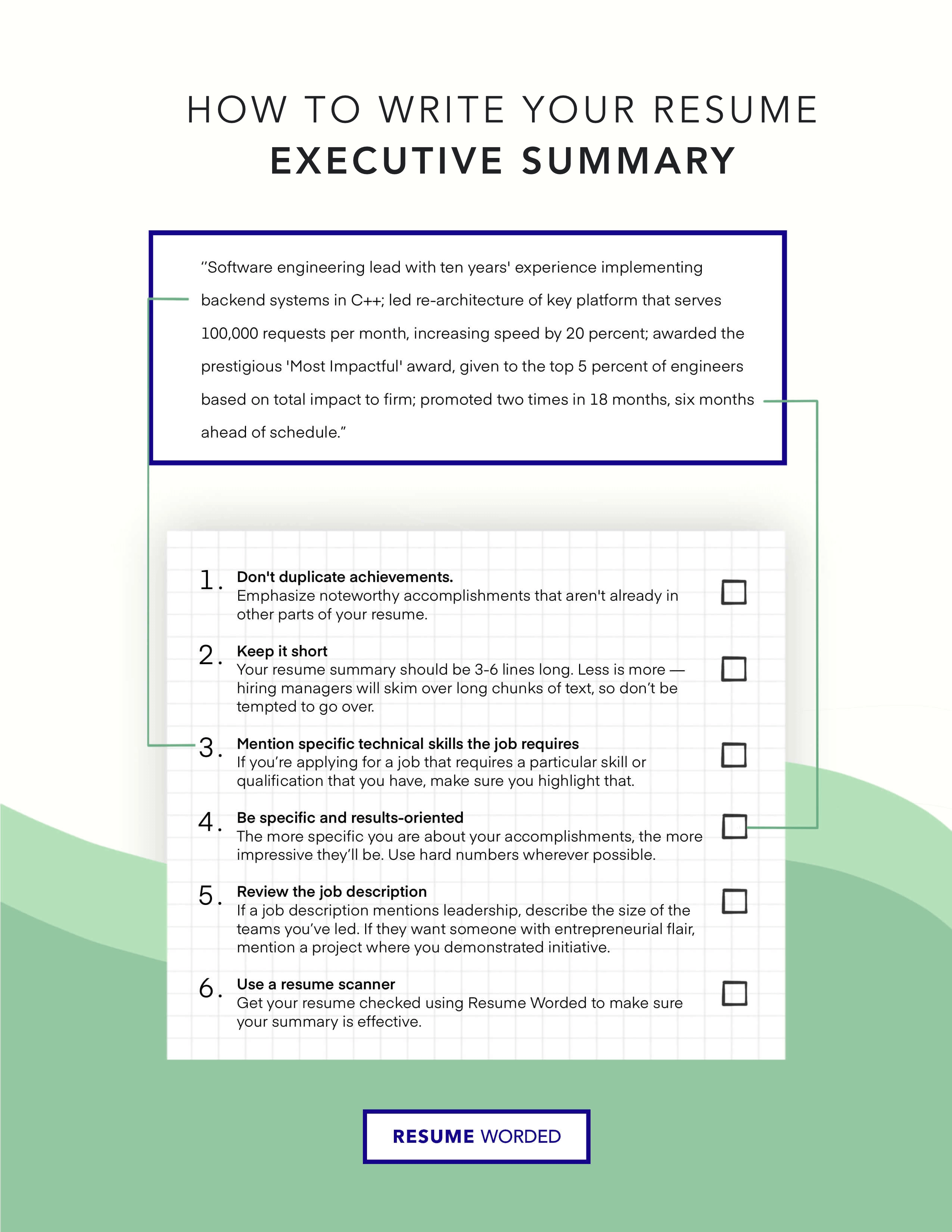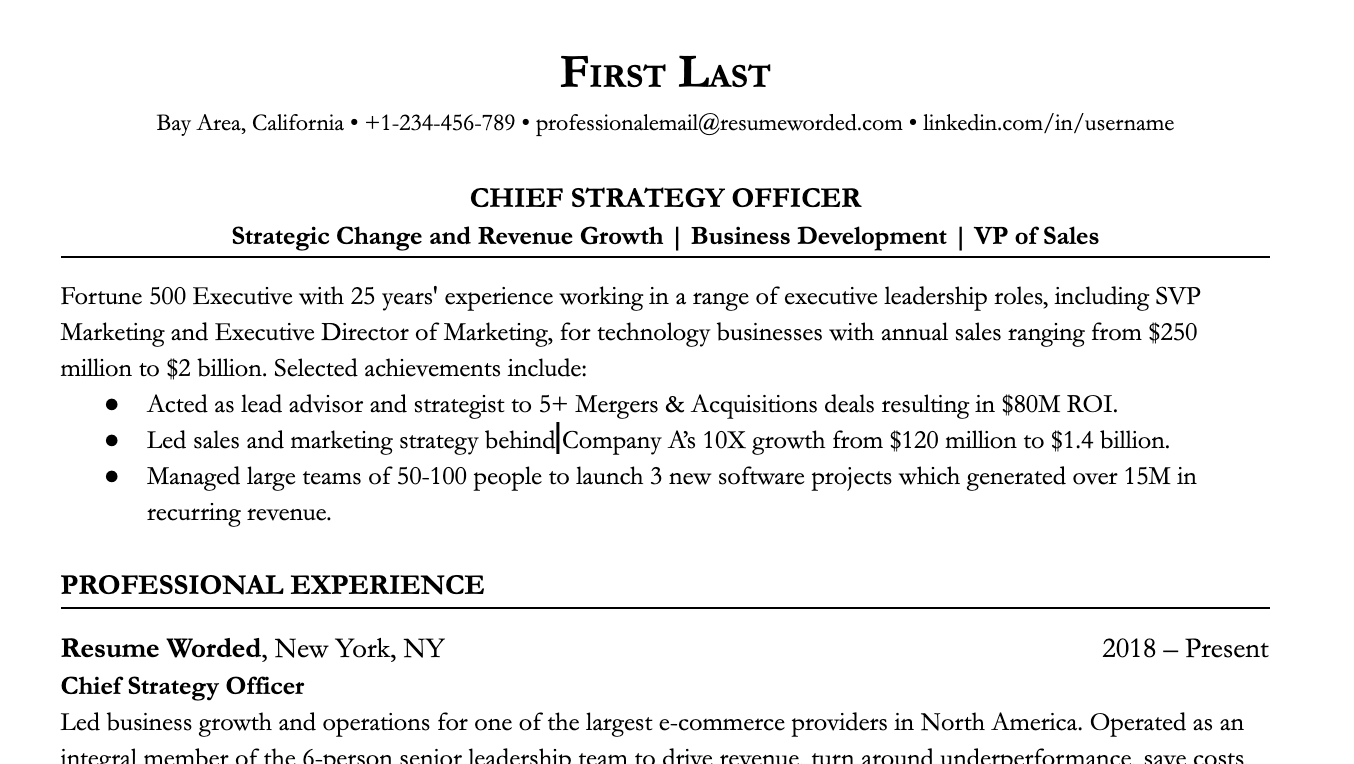This is part 4 of our how to write an executive and senior-level resume guide. Navigate through different parts of the guide:
• Part 1: Overview, templates and key tips
• Part 2: Executive resume summary [you are here!]
• Part 3: Work experience and bullet points on executive resumes
• Part 4: Skills section on executive resumes
• Education, optional sections, and additional executive resume tips
An executive summary is a short section at the top of your resume briefly outlining your key skills and experience. Despite the name, the purpose of an executive summary is not to summarize the information already in your resume, but to provide additional context about the scope and relevance of your accomplishments.
Key tips to take into account for your resume's executive summary
Here are some tips to keep in mind when writing your executive summary:
- Keep it short — no more than 100 words or 3-5 lines
- Lead with the job title and mention how many years of experience you have in the role or industry
- Be specific — use hard numbers and metrics to let your accomplishments speak for themselves
The point of an executive summary is to put the most important information about your candidacy upfront, where it’s more likely to catch a recruiter’s eye. Think of it like an elevator pitch for a resume — instead of scattering details about your expertise over 2-3 pages of a resume, the executive summary provides that information all in one place for easy reference.
How to write an executive summary for your resume
- Lead with a job title that's specific to the role you want. e.g. Marketing Director or CMO if you are going for an executive marketing role.
- Highlight 2-3 of your biggest accomplishments from your career that show your seniority and impact at your previous companies.
- Include metrics and hard numbers to give additional context. Try to relate your accomplishments to your previous company's bottom line (e.g. increase in revenue, decrease in costs)
- Run your resume through a resume checker which will check your resume's summary and tell you how it scores.
Find out if your executive summary is strong enough
Executive resumes often follow different rules to that of more junior-level job seekers. For example, most entry-level to junior-level resumes are not expected to have a resume summary, but for an executive it is important to have a summary at the top of your resume that highlights your experience and expertise. A good way to check if your executive summary highlights the right accomplishments is to upload it to the tool below — it’ll tell you if your resume has shown enough quantifiable accomplishments, leadership and management skills and other skills fit for executive roles.
Tailor your summary to the roles you want
You also want to make sure you’re tailoring your summary to the company and position you’re applying for. Hiring managers are picky about applicants who apply to any and all executive positions, so make sure your summary focuses on the specific role. For example:
- If you’re applying for a financial role (e.g. CFO), highlight major finance projects
- If you’re applying for a technical role (e.g. CIO or CTO), include tech-heavy accomplishments
- If you’re applying to larger companies (e.g. Fortune 500), emphasize big structural projects
- If you’re applying to startups, focus on projects you took from the idea stage through to launch
Executive summaries should also be more detailed than a standard resume summary. You can use a handful of bullet points to emphasize your most noteworthy accomplishments. These can include highlights from your professional experience, qualifications, awards, or anything else that speaks to why you’d be the ideal candidate for the job.
An easy way to check if you have tailored your resume to the executive position you’re applying to, is to use the tool below to search for the role and it’ll give you a list of skills and keywords that executive recruiters look for. For example, search for a job like Chief Marketing Officer, or other executive positions and the tool will provide a list of skills relevant to the job.
Examples of executive summaries
Here are two templates that senior-level job seekers find a lot of success using for their executive summaries:
Template 1:
[Executive] with experience leading [industry] businesses [describe size of businesses]. [Describe impactful element of role, with specific numbers]. Proven experience [mention 2-3 skills that are relevant to the job]. [Optional: Describe relevant educational certification/accomplishment, or one significant accomplishment in the format of Action Verb + Accomplishment + Metric].
Here's the template in action:

Template 2:
[Chief Executive Officer] with [X] years' experience [doing x and y; brief description of the types of companies you've worked at; if you worked at big brand names, mention them here]. Results include:
• [Bullet point achievement in the format of Action Verb + Accomplishment + Metric]
• [Bullet point achievement in the format of Action Verb + Accomplishment + Metric]
Here's an example of this template:
Fortune 500 Executive with 25 years' experience working in a range of executive leadership roles, including SVP Marketing and Executive Director of Marketing, for technology businesses with annual sales ranging from $250 million to $2 billion. Selected achievements include:
• Acted as lead advisor and strategist to 5+ Mergers & Acquisitions deals resulting in $80M ROI.
• Led sales and marketing strategy behind Company A’s 10X growth from $120 million to $1.4 billion.
• Managed large teams of 50-100 people to launch 3 new software projects which generated over 15M in recurring revenue.
On a resume, it might look like this:

Here's a second example executive summary for a senior level resume:
The executive summary is also an ideal place to include important keywords. Create a headline that includes your core competencies and insert it on a single line below the job title.
Next up: Work experience and bullet points on executive resumes









